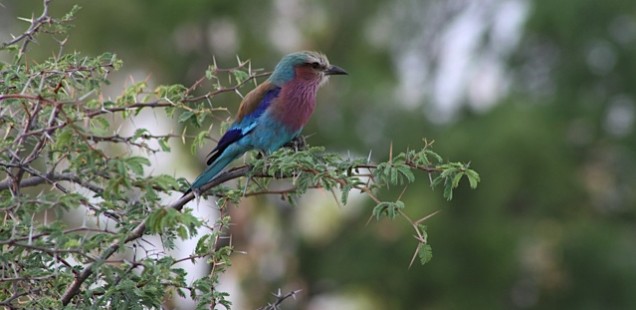So much of what I experienced in Africa was larger than life – vast wilderness, enormous animals, big, big thinking about head-spinning topics like sustainability, evolution, the eco-system, poverty, beauty, instinct and extinction to name a few.
What I really want to share with you however, is something much less in-your-face. On safari I learned to appreciate what I am calling “deep listening”. Most of us can hear, but this type of listening is a learned skill. There were the obvious sounds of animal calls, birds, and the occasional growl from an unknown source, but the ability to recognize the bigger picture and the relationship/behavior between the species requires years of study, stillness, presence and respect.
On a typical morning we were awakened at 5am for a mug of coffee or tea and a light breakfast. Our wonderful guide, Ona Basimane was always eager to be the first car out of camp. We’d grab our cameras, binoculars and water, climb into the Land Rover and set out before sunrise. The roads are not for the faint of heart: sandy, bumpy and curvy is putting it mildly. We’d see the sunrise and enjoy the coolness of the morning. To those of us with un-trained senses, the scenery was desert-like and somewhat repetitive. Then Ona would stop the vehicle and put his finger to his lips “Shhh, do you hear that?” he’d ask. We’d shrug and reply “Maybe”, “I think so”, “Not really”. “It’s a Guinea Fowl and he’s not happy – let’s go see what’s happening”. Without warning he’d take a sharp turn, bounding over scrub, bushes, logs or anything else in our wake. Sure enough, Ona would spot the evidence of a leopard (paw prints or scat), a wild dog or hyena. This finely tuned listening developed over years of living and working in the bush.
I asked Ona about the importance of his listening skills:
Personally I think the art of listening is as important as the art of observation. I enjoy listening to the bush as I drive. After years of observing how different animals react to the presence of predators, I have come to know that a distress call from a Guinea fowl might mean there is a predator in the area. I have come to know when cats are mating, or cubs are playing, or a lion pride is on a fresh kill. This means I can safely predict what the animals are doing without having spotted them yet.
On distress calls, I have come to know which animals are reliable when they give alarm calls. If I am tracking a leopard, I have to constantly listen to any distress calls from Guinea fowls, Impala, or Kudu. I know that a Kudu never bluffs; a distress call from a kudu means there is definitely a big cat in the area. A squirrel however, can be alarmed by anything, so his distress call may or may not mean anything.
In our day-to-day life we rarely take the time to stop and listen; to one another or to our surroundings. What we miss are the subtleties and non-verbal cues that are also loaded with information. When we choose not to listen we miss the opportunity to understand what someone else is really feeling or believing. It’s far easier to become judgmental rather than empathic, and this is where relationships suffer. Along the same lines, in order to predict a rain or snowstorm it is much easier to tune into a weather report than listen to birdcalls or note the behavior of our animals. The opportunity is there; the choice is ours.
That’s only one of the lessons I learned in Africa. Looking forward to sharing more of them with you.
Music to my ears,
Joan
Ona Basimane is a guide for Wilderness Safaris in the Okavango Delta, Botswana and a wildlife photographer. He was a speaker at Wild Shots Symposium in Cape Town, S.A. this month. Read more about Ona in his bio: https://www.wildshotsevent.com/speakers/


Comments
Yummy. I’m going to focus more. The cape is full of sounds…
Thanks for sharing this.
Lucky you Sue! The perfect place for deep listening.
just wonderful joanie.. and ever so true…. why i like being alone sometimes bc i feel my senses are heightened…. and i do notice that i hear more.. not only of that outside myself but even that which comes from within
Nina – Yes, we need to listen more to our own messages. Love that!
Beautiful Joanie. So true and just one of many things learned in the bush and from our wonderful guides.
Shhh – did you hear that? Let’ go back to check it out 🙂
Beautifully said by both of you. Amazing our capacity to discern the subtle messages from our inner and outer worlds (really no difference, tho, eh?!). Looking forward to the next post.